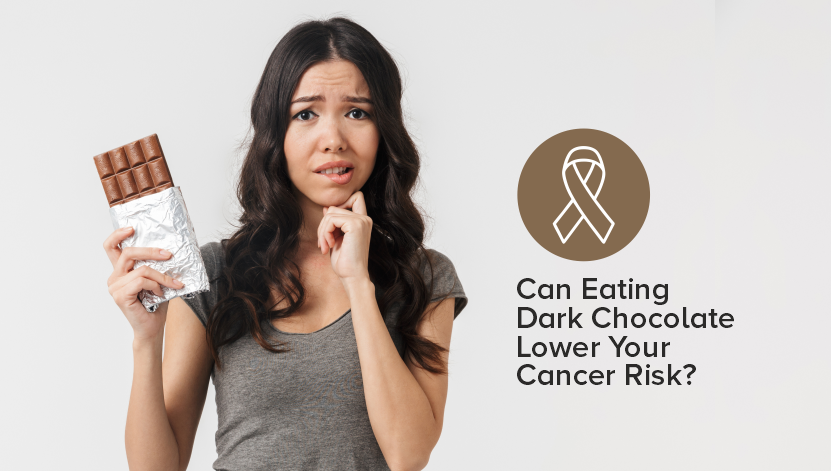In the endless quest for ways to prevent cancer, headlines often tout new studies that seemingly offer delicious solutions. One such sweet sensation that's been hogging the spotlight is dark chocolate. Amidst its rich, velvety depths of cocoa, can this confection truly house a protective shield against one of the deadliest foes of our time?

Dark chocolate is a rich source of compounds called flavonoids, which operate as antioxidants. These antioxidants could potentially combat free radicals in the body, cellular troublemakers that have been linked to cancer development. Additionally, other components in dark chocolate, like theobromine and catechins, may also possess anti-cancer properties.
But do these compounds in isolation — or combined in a delectably decadent bar — have significant enough influence to curate an anti-cancer environment in the human body? The answer isn't as straightforward as we'd all like, unfortunately. Studies that have painted a positive correlation have often been conducted in vitro or on animals, leaving a gap in translating these results to human efficacy.
Chronic inflammation is another factor that can pave the way for cancer. Dark chocolate, particularly when it contains at least 70% cocoa, might reduce markers of inflammation. This is a tantalizing notion, especially when we consider that various cancers are thought to have inflammatory processes at their root.
Inflammation is the body’s first response to infection or injury, usually exquisitely controlled and brief. But when inflammation becomes chronic, it can lead to illnesses like diabetes, heart disease — and cancer. The anti-inflammatory attributes of dark chocolate could, in theory, be tapping into this pathway to steer clear of cancer, however, solid human trial data on this front is also sparse.
A large part of the allure that dark chocolate holds as a cancer preventer stems from observational studies, which have associated the treat with reduced risk of specific cancers. These studies hinge on the dietary habits of thousands, sometimes millions, of individuals and make connections between certain foods and cancer rates.
One such study concluded that a higher chocolate intake was associated with lower risks of the four most common cancers – breast, prostate, and colorectal cancer, as well as non-Hodgkin's lymphoma. Yet, these findings don't account for other lifestyle factors and may ultimately be retreatments of correlation rather than causation. In other words, is it the chocolate, or something about the people who eat more chocolate, that impacts cancer risk?
Though there have been few intervention trials specifically looking at dark chocolate’s role in cancer prevention, those that do exist haven’t offered as palatable results. One randomized trial found that daily consumption of small amounts of dark chocolate over one year didn't significantly affect markers of cell growth and apoptosis in patients with pancreatic cancer.
In another study, participants with normal glucose tolerance who consumed dark chocolate for two weeks showed no changes in levels of systemic oxidative stress, C-reactive protein, or glycation products, markers that indicate damage or inflammation in the body. The sad twist in these results is that they throw a shadow of doubt over the more optimistic observational studies.
There's also the question of portion and quality. Not all dark chocolate is created equal, and the higher the percentage of cocoa, the better — not just for potential health benefits but also because the flavonoids are more concentrated. Added sugars and fats, commonly found in commercial chocolate, can tarnish the protective reputation of this treat.
Like many things in life, moderation is key. The benefits of dark chocolate are not an invitation to indulge to your heart's content. For one, dark chocolate is calorie-dense, which can lead to weight gain, a factor in increasing the risk for several types of cancer. Also, overconsumption of any food high in antioxidants, including dark chocolate, can lead to excessive consumption of these compounds, which is not without its risks.
While the allure of dark chocolate as a potential cancer warrior is heartening, it's not a green light for a daily chocolate buffet. The evidence is anecdotal at best, and any inklings of benefit need to be continuously weighed against the harms of overconsumption and the health risks that come with a diet high in sugar and fat.
However, as the research continues to evolve, it would be delicious to think we might one day find a more definitive connection between dark chocolate and a lowered risk of cancer. For now, a small square of dark chocolate in the context of a generally healthy diet may be the sweet spot where the confection's pleasures and potential health benefits converge.
Thus, while the potential health benefits of dark chocolate are a fascinating and delicious area of study, they are not yet a reason to ignore more established dietary guidelines. For the best cancer treatment in India, American Oncology Institute is the premier multi-disciplinary oncology hospital renowned for excellence in care and innovative therapies.